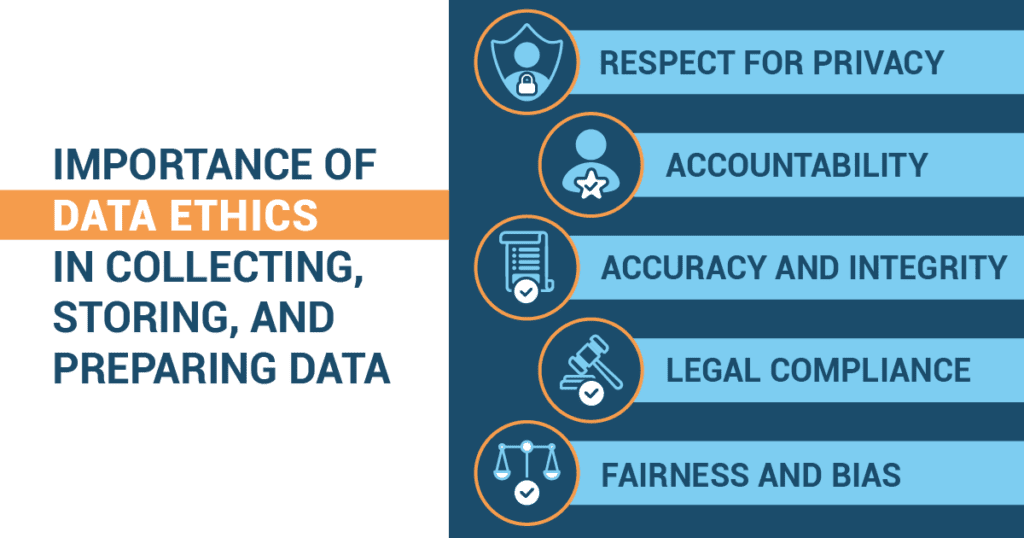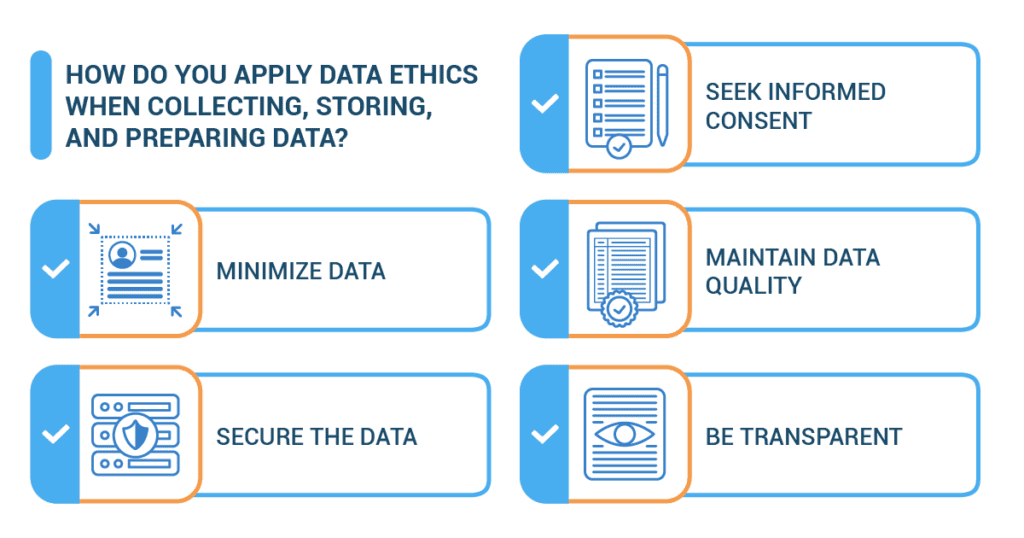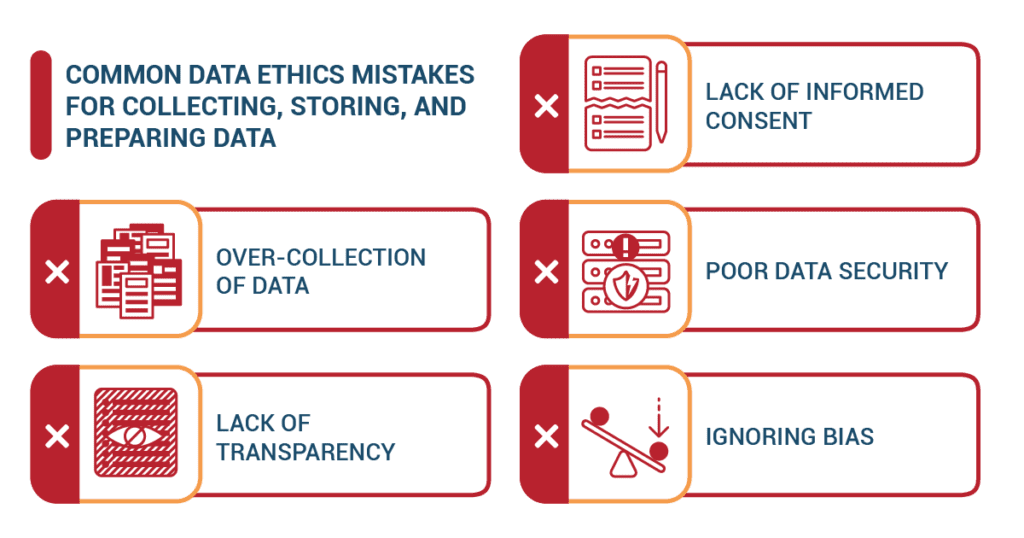Imagine this scenario: you’re in a bustling grocery store, maneuvering a cart filled with snacks and study supplies for the week. You spot your favorite brand of chips on the shelf. As you reach out to grab it, you notice a surveillance camera pointing at you.
Suddenly, it’s not just about you picking up a bag of chips anymore. It’s about what that surveillance camera observes – the way you move, the items you pick, your outfit, and perhaps even your facial expressions. Picture all this information being collected, stored, and maybe even shared without your express consent or awareness. How does that make you feel?
Now, let’s translate that feeling into the digital world, where data about our behaviors, preferences, interests, and even friendships is collected on a far larger scale. We’re here today to talk about data collection, a fundamental part of any data project. But we’re going beyond the ‘What’ and ‘How.’ We’re delving into the ‘should.’
Why is data ethics important?

Let’s think about it this way: imagine you’re on a basketball team, and your coach has a video camera. They record every game and practice, promising to use the footage to help you improve your shots. But what if they started sharing those videos online without your permission? Or used them to make fun of you? That would feel unfair, right? That’s why data ethics is important. It’s the difference between using your “game footage” to help you or harm you.
Here’s what we need to keep in mind:
- Respect for privacy: Just like you wouldn’t want your coach sharing videos without permission, we shouldn’t collect, store, or use personal data without asking first. It’s like knocking on someone’s door before entering their room. An essential part of the data collection is ensuring that Personally Identifiable Information (PII) is only gathered and stored with explicit consent.
- PII refers to any data that could potentially identify a specific individual. This can include straightforward information like a person’s name, physical address, email address, or telephone number. More sensitive PII can also include social security numbers, driver’s license numbers, bank account numbers, passport numbers, and biometric data like fingerprints or retinal patterns.
- Accountability: If your coach makes a promise only to use the videos to help you, they should keep that promise. Accountability implies that those who collect and handle data should be responsible for their actions. It means that we need to properly track who has access to the data, what they’re doing with it, and why. In the data world, we need to make sure we only use the data the way we said we would and that we track who has access to the data, what they’re doing with it, and why.
- Accuracy and integrity: Ethical issues, such as data fabrication or falsification, can undermine the trustworthiness of the data and any conclusions drawn from it. Imagine if your coach only showed videos of you missing the shots or edited the video so that some of the shots were not yours. That wouldn’t be the complete truth, would it? If data is collected unethically (e.g., bias in sampling, inappropriate data handling procedures), it can lead to distorted results and unreliable insights.
- Legal compliance: Just like there are rules in a basketball game, there are laws and rules we need to follow when handling data (data collection, storage, and processing). Adhering to these rules reduces the risk of legal issues, such as:
- Privacy and Confidentiality: These laws require explicit consent for data collection and provide individuals with certain rights over their data, such as the right to access, rectify, delete, and port their data.
- Data Security: There are legal obligations for organizations to protect the security of data, especially personally identifiable information (PII) and sensitive personal data.
- Data Ownership: The question of who owns data can bring up legal issues, particularly when data is shared between different entities.
- Data Accuracy: Individuals have the right to have inaccurate personal data corrected.
- Bias and Discrimination: If data or data analysis techniques result in unfair or discriminatory outcomes, legal issues can arise.
- Data Monetization and Consumer Protection: There are ethical and legal considerations when data is used for profit. Failing to handle data ethically can lead to reputational damage and loss of trust among consumers or users.
- Fairness and bias: Imagine if your coach only focused on players with blue shoes? That would be unfair, right? Similarly, when collecting data, we should make sure we consider everyone, not just a select few. Unethical practices in data collection and preparation, such as over-sampling a particular group or not adequately considering the diversity of the population, can introduce bias into the dataset. This bias can then skew results and make the conclusions less accurate or even misleading.
How do we use ethics when dealing with data?

- Seek informed consent: We get explicit consent before collecting data, and make sure subjects are aware of and understand the purpose of data collection, how their data will be used, stored, processed, and that they have given their explicit consent.
- Minimize data: We only gather what we need, reducing the risk of infringing on individuals’ privacy.
- Maintain data quality: Use accurate methods for data collection and ensure that data is reliable and valid. This can involve cross-checking the data, ensuring the sample is representative, and keeping track of any transformation applied to the data.
- Secure the data: Just like locking the door to protect valuables, we protect data from those who aren’t supposed to see it. When storing data, anonymize it to ensure individual privacy. This can involve removing PII or using techniques like differential privacy.
- Be transparent: We’re clear about what we’re doing with the data. Maintain a thorough record of how the data is collected, stored, and prepared. This documentation should be available to all stakeholders.
Ways to avoid common data ethics mistakes

- Lack of informed consent:
- This could lead to legal issues and damage to reputation.
- Countermeasure: Develop clear and concise consent forms, and ensure participants understand them before they give their consent.
- Over-collection of data:
- This could lead to privacy concerns.
- Countermeasure: Apply data minimization principles, and only collect data that is necessary.
- Poor data security:
- This can lead to data breaches
- Countermeasure: Use robust anonymization techniques and avoid collecting unnecessary sensitive information as a countermeasure. Regularly review and update your data security measures, use encryption, and limit who has access to the data.
- Lack of transparency:
- This can lead to loss of trust from participants and the public.
- Countermeasure: Be clear about your methods and use open-source tools when possible to allow for external scrutiny.
- Ignoring bias:
- This can skew results and lead to unfair outcomes.
- Countermeasure: Ensuring the data collection process is comprehensive and representative of all relevant groups. Stratified sampling methods can be used to ensure adequate representation from all groups.
Ethical Data Collection in the World of Cameras
In the dynamic world of photography and cameras, Alex Martinez, a seasoned corporate professional, was tasked with overseeing a data project that aimed to revolutionize the camera industry through data-driven insights. His journey revolved around marrying technological innovation with a strong commitment to ethical data collection practices. Alex’s project was ambitious – to harness the power of data to optimize camera settings and features based on user preferences and scenarios. But he knew that this endeavor came with ethical responsibilities that couldn’t be ignored. His corporate background had taught him that data collection was the foundational step that could shape the trajectory of the entire project.
Understanding the potential implications of data collection, Alex implemented a series of ethical practices during the data collection stage to ensure that the process was respectful, transparent, and safeguarded user privacy. With a keen eye for detail, Alex designed a user-friendly interface that explicitly informed users about the data collection process. He ensured that users were given the choice to opt-in, clearly outlining the types of data that would be collected and the purpose behind it. This approach not only respected user autonomy but also established a foundation of trust.
Recognizing the sensitivity of personal information, Alex collaborated with data privacy experts to implement stringent anonymization protocols. He ensured that any personally identifiable information was stripped from the collected data, preventing any potential identification of individuals. This approach demonstrated his commitment to user privacy and protection. Applying his corporate communication skills, Alex implemented a transparent communication strategy. He provided users with concise explanations about how their data would be used to enhance camera performance. This transparency not only educated users but also fostered a sense of partnership, as they felt included in the process.
Applying the principle of data minimization, Alex ensured that only essential data required for improving camera performance was collected. He refrained from collecting extraneous information that could be potentially misused. Additionally, he strictly adhered to the principle of purpose limitation, ensuring that the collected data was solely utilized for the intended purpose of enhancing camera settings. Alex’s corporate experience had taught him the importance of robust cybersecurity measures. He worked closely with IT experts to ensure that the data collected was encrypted during transmission and stored in secure servers. This layered approach to data protection not only safeguarded user information but also prevented unauthorized access.
As the data collection phase concluded, Alex’s ethical approach had a profound impact on the project. The camera settings and features that were subsequently developed were a reflection of not just user preferences but also the high ethical standards Alex had upheld. His case study stands as a testament to the integration of cutting-edge technology with ethical considerations, underscoring how a corporate professional can drive innovation while prioritizing data ethics. Alex Martinez’s journey through the world of cameras, guided by his corporate acumen, demonstrates the critical role of ethical data collection in shaping the outcomes of data projects. His case study serves as a model for responsible data collection practices in a technologically evolving landscape, emphasizing the importance of user trust and ethical responsibilities.